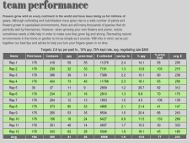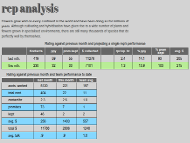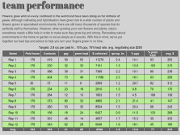- home
- writing samples
- photos
- spreadsheets
Spreadsheets

The team performance spreadsheet charts the performance to date of a call center team over a wide variety of performance parameters.Read more...

The rep analysis spreadsheet compares a rep's performance to the previous month and the team average.Read more...
- web interests
Some of my favorite links
Staying abreast of technology

MIT's Technology Review's mission is to identify important new technologies—deciphering their practical impact and revealing how they will change our lives.Read more...

Lifehacker offers tips, tricks, and downloads for getting things done.Read more...
-
contact
writing samples...credit
What’s in your Credit Report?
If you have less than perfect credit and are thinking that you may not qualify for your next mortgage, car loan or credit card, think again. Rather than listen to what friends and family may be telling you, find out for yourself what kind of financial shape you are in. Start by getting a copy of your annual credit report from Equifax, Experian, or Trans Union, the major credit bureaus.
Some states mandate that you must be given two free copies of your report upon request every year. All three bureaus have websites or 800 numbers that will allow you to order a copy of your credit report though they are not required to give you your credit report score and may charge you for that service.
You may be thinking “What’s in my credit report and how does my credit report affect me?” The answer to both is “a lot.” Your annual credit report is a compilation of records of all the credit items you have had and a history of your record of payments. Your score is an analysis of the amount of credit you have available and are using, combined with the record of payments you have made over the past few years. Your credit report score is calculated using a complicated and secret algorithm that assigns you a rating between 400 and 800, your “score”.
Detailed Records
Let’s look at what else is shown on your credit report. It starts with a record of your social security number, current address and telephone numbers and may contain your spouse’s name and social security number and your date of birth. Any public records linked to your name will be displayed on your credit report, including bankruptcies, judgments against you and the like. Next up are detailed records of your credit cards, mortgages, student loans, car loans and most other credit items. Utility companies, rental properties and many other types of creditors may report to the credit bureaus as well.
Most entries on your credit report will show the date the credit item was opened, the credit limit of the account, the highest balance you have used and the monthly payment due. A date next to each item shows the last date you paid and another entry shows whether the account was paid, charged off or still active.
Signs of trouble brewing
Your annual credit report is your financial scorecard and can make all the difference in your being turned down for a loan, credit card, insurance or employment. Late or unpaid items on your credit report indicate to a potential lender that you may represent a risk at some future date, as indicated by your past behavior. Of course, your behavior may have been intentional at the time, as sometimes happens when you lose a job or become incapacitated. Unfortunately, your credit report doesn’t show the whether your failure to pay on time was intentional or beyond your control.
Paying a higher interest rate on a car loan is a painful reminder that you may have been a little careless in the past. But higher interest rates are only a part of what you may pay. Your insurance application could be turned down and so could your job application as many employers now treat poor credit as a predictor of job performance. Rental and utility companies frequently run credit checks before allowing you service and a spotty credit record may mean hefty deposits on your part.
Errors on your report
Errors on your annual credit report can have as adverse an effect as if you had defaulted on a debt. It is possible that your credit report contains erroneous information meant for someone with a closely related social security number, a similar name or a nearby address. Even errors in addresses could cause good credit information to be left off your report, and that can have as much effect on your credit score as bad news. If you are trying to build or rebuild your credit, you want as much good information as possible to show up on your credit report. Should you find any errors on your credit report, send a formal request to the credit bureaus and have the incorrect information removed. If you don’t have the time to do it yourself, there are online credit report tools that can walk you through the process.
You are allowed by law to request a detailed statement substantiating your debt from any company that posts information to your credit report. The Fair Debt Credit Reporting Act requires creditors to give you a response within 30 days of your request, otherwise they must remove the item from your credit report. If the statute of limitations has run out, you can request removal of the item from your credit report. But do not take this to mean that you don’t owe the debt any longer, as I do not endorse walking away from one's obligations.
There are many other details to learn about your annual credit report and about improving your credit score but you can start now by calling the three main credit-reporting agencies: Trans Union (800-916-8800), Equifax (800-685-1111) and Experian (800-682-7654).
Your Credit Report Score
If you are concerned about your credit report score and wondering what to do about it, read the following tips on taking charge of your credit future and raising your credit report score. With a little patience and a lot of persistence, you may be able to add significant numbers of points to your credit report score within a few months.
Paying on time
Late payments on regular monthly bills will quickly reduce your credit report score and should be avoided at all costs. Bank loans and credit card debt are probably the easiest to miss paying as they are not as life-threatening as forgetting to pay the electricity or gas bill. If you are internet savvy, one of the best ways of avoiding late payments is setting up automatic payments through your financial institution’s website. Credit unions are perhaps the most amenable to this form of bill payment as some banks may charge for the service. Automatic payment of your major bills will help you avoid the hit to your credit report score from going more than thirty days late and is handy for the perennially forgetful.
If you are in danger of a job loss, you can take steps to protect at least your credit card debt from showing up as late payments if your severance or unemployment benefits run out. Most major credit card issuers offer programs that will cover your monthly payments if you lose a job or become disabled. Of course you won’t want to wait until you are out of work before you set these up. And you won’t be surprised that they come with fees attached.
Closing Accounts
Credit scoring companies put a lot of weight on the length of your credit history. I have spoken to many people who thought shutting down their credit cards would improve their credit report score. Sadly, this is not necessarily so. Closing newer credit accounts may well improve your score by reducing the amount of credit you have available and the chance that you may go out on a shopping spree. But closing your oldest accounts reduces your credit report score because it removes you longest history of payments from consideration when your score is compiled.
Accounts you will want to close are the obvious ones like utility and telephone services if you move houses. You would be surprised at the number of instances I have encountered of well-intentioned people who move across the country and wrongly assumed they had got the final, final bill from their gas or electricity company. If you have moved recently, or are planning a relocation, make sure your utility or cell phone provider has a forwarding address. I closed an account in December with my natural gas provider, only to be surprised by a residual bill the following March.
Moving abroad is particularly tricky as your mail may never follow you for several weeks, if not months. And if you are in the military and stationed abroad, be very careful to ensure that someone back home is taking care of your bill payments. Some military personnel incorrectly assume that the Soldiers and Sailors Relief Act suspends their obligation from paying recurring bills.
Credit card imbalances
Let’s says you have three credit cards with limits of $10,000, $5,000 and $4,000 each and you are carrying balances on all of them or are about to make a large purchase using one of the cards. You would assume it may be best to use the card with the lowest interest rate and this may be the one with the $4,000 limit. But your credit report score could take a hit while you are trying to minimize interest charges. That’s because your score can be adversely affected by having a high debt to credit ratio on one of your credit cards. If your big purchase cannot be avoided, use the card with the higher available total credit to lower the impact on your credit report score.
Paying down your debt
Lowering your total debt to income ratio can have a dramatic effect on your credit report score as the scoring algorithms are reported to weigh heavily in favor of your ability to “cover” your debt. If you are running on fumes from month to month, as I have done at some point in my life, you know it will take serious discipline to chip away at your debt. One of the most obvious ways to reduce your monthly outlay of cash and thus provide more funds for your debt-reduction plan is to avoid recurring expenses like the plague. And the ugliest of recurring expenses can be that old staple, the car loan.
I have avoided paying a car note since 1982 by buying a succession of modest used cars that I have rigorously maintained. I can hear you groaning now and I realize this is not for the faint of heart, but if you are struggling under a $400 or $500 installment loan, you may be shoveling your hard-earned paycheck down a pit. You could save yourself one or two hundred dollars each month by switching to a used car and purchasing an extended warranty.
Goosing your credit report score
What if you are fresh out of college or just stepped off a plane and have no credit? You may be surprised to learn that no credit is worse than bad credit just as no track record is worse than a spotty but existing track record. If you have made it though college while avoiding the credit card trap to which many college kids succumb, one of the easiest ways to jump start your credit report score is by applying for a secured credit card. You can do this by depositing some cash in a restricted account.
Most banks will issue you a credit card with a limit set by the amount of cash you have deposited. If you use the card regularly and pay on time, they may then lift the restriction on your deposit and change your account to a non-secured designation. After you have developed a feel for paying your credit card on time, it may be a good idea to call your credit card issuer and ask them to raise the limit. Remember, the higher your debt to credit ratio, the higher your credit report score is likely to be. Oddly enough, an auto loan can work wonders for building your track record as a disciplined payer, and building a flawless credit profile will improve your score, provided your income comfortably exceeds the debt you are taking on.
Avoid card collecting sprees
I have seen many instances of consumers carrying credit cards from several well known department stores and electronics and computer manufacturers and retailers. You should avoid a proliferation of credit cards with small limits like the proverbial plague. And be very careful what you sign up for, whether on the internet or at in-store promotion booths.
Paying off old debt
I am reluctant to advise you to avoid paying off old debt as I am a stickler for living up to my personal obligations. This may become a matter of personal choice for you but you should know that paying an old debt that has languished on your credit report for years revives the account as a current collection activity, a certain means of lowering your credit report score. Better to boost your score, sign your loan, then pay off the old debt.
All this sounds simple enough when you are reading about it but can be difficult to put into practice. Remember that there is no quick fix for boosting your credit report score. It will take discipline and patience and will create some annoyances in your life, but in the long run it can save you bucketsful of cash.
SPREADSHEET DEVELOPMENT
Samples of my interest in performance analysis and training... FOLLOWLANDSCAPE PHOTOGRAPHY
Samples of my interest in landscape photography... FOLLOWAUTO PHOTOGRAPHY
Samples of my interest in automotive photography ... FOLLOWCONSTRUCTION PHOTOGRAPHY
Samples of my interest in construction photography... FOLLOWWEB DESIGN
Samples of my webpage designs... FOLLOWFormal Training
- Bsc. Business Administration
- HTML 3.2
- SAP FICO
- SAP BW/BI
Industry experience
- hotel management
- marketing management
- publishing/web design
- call center management
© May 2013 mmfDESIGNS
contact the webmaster if you have any questions or concerns
chief design officer: Mike McFarlane
mike mcfarlane's resume





